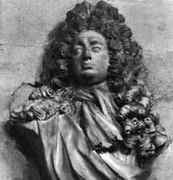Person: Gregory (3), David

David Gregory was was a nephew of James Gregory who become a professor of mathematics in Edinburgh and Oxford. He did important work on series and in optics and was a strong supporter of Newton in his dispute with Leibniz.
Mathematical Profile (Excerpt):
- Perhaps the first thing we should note is the spelling of 'Gregory'.
- It is uncertain where David attended school, but it is thought that he attended Aberdeen grammar school.
- We know for certain that Gregory studied at Marischal College, part of the University of Aberdeen, between 1671 and 1675.
- While Gregory was on the Continent he took the opportunity to study mathematics, although he began his time abroad as a medical student at the University of Leiden.
- We have not yet mentioned Gregory's friendship with Archibald Pitcairne.
- Details of when the two first met are not known but they may have met while Gregory was on the Continent.
- Between 1681 and 1683 Gregory lived at Kinnairdy where he continued his study of James Gregory's papers.
- However in 1683 Pitcairne publicly challenged John Young, who had taught mathematics at Edinburgh University since James Gregory's death, as to his suitability to do so.
- At Edinburgh David Gregory taught some Newtonian theories but it now realised that he laid much less influence on this than was at one time thought.
- Gregory sent Newton a copy of his paper on infinite series, taking care to offer extensive praise to Newton.
- Gregory received a copy of Newton's Principia in 1687, and again he replied with a letter heaping the highest praise on the author.
- the analysis of these notes suggests that the copy is the one annotated by David Gregory.
- By 1690 all university teachers were required to swear an oath of allegiance to the new Scottish rulers, but although he refused, Gregory was not dismissed.
- However the difficult position he was in as an Episcopalian was certainly one of the reasons that David decided to leave for England.
- It was not that Gregory held strong religious views, but his background and Jacobite friends gave him difficulties.
- The cause can be traced back to Scottish Episcopalians, in particular David Gregory and Archibald Pitcairne, who were among the most influential and charismatic Scottish Newtonians.
- In 1691, the year after Presbyterianism was established as the official state religion in Scotland, Gregory resigned the mathematical chair at the University of Edinburgh and assumed the Savilian Professorship of Astronomy at Oxford.
- Primarily under the influence of Gregory and Pitcairne's Scottish disciples and colleagues at Oxford, Newtonian concepts were transmitted to High-Church Anglicans.
- In 1691 Gregory, as indicated in the above quote, was elected Savilian Professor of Astronomy at Oxford.
- The lecture also shows that Gregory was very happy to have left the troubles of Scotland behind him.
- In 1692 Gregory was made a fellow of Balliol College and was awarded a degree from Oxford for a thesis on optics which he based on the lectures he had given in Edinburgh.
- Gregory, supported by Newton, was appointed as a mathematics tutor to the young Duke of Gloucester in 1699.
- However this was not the triumph that Gregory hoped for since the young Duke died in 1700.
- David Gregory certainly supported Newton strongly in the Newton - Leibniz controversy arguing, as did Gregory's friend Wallis, that Leibniz had learnt of the calculus through a letter from Collins.
- In 1702 Gregory published Astronomiae physicae et geometricae elementa which was a popular account of Newton's theories.
- It continued to be influential well after Gregory's death and second editions of both the English and Latin versions were published in 1726.
- In 1704 Gregory moved to London and three years later, again with Newton's support, he was appointed to the position of master of the Scottish mint.
- 1707 marks the union of the parliaments of England and Scotland, an event which Gregory had strongly supported.
- Gregory spent some months in Edinburgh in his role with the Scottish mint working on bringing the Scottish currency into line with that of England.
- Gregory's health had been poor over a number of years and he was advised to go to Bath so that he might be cured.
Born 3 June 1659, Aberdeen, Scotland. Died 10 October 1708, Maidenhead, Berkshire, England.
View full biography at MacTutor
Tags relevant for this person:
Astronomy, Origin Scotland, Number Theory, Physics, Special Numbers And Numerals
Thank you to the contributors under CC BY-SA 4.0! 

- Github:
-

- non-Github:
- @J-J-O'Connor
- @E-F-Robertson
References
Adapted from other CC BY-SA 4.0 Sources:
- O’Connor, John J; Robertson, Edmund F: MacTutor History of Mathematics Archive
